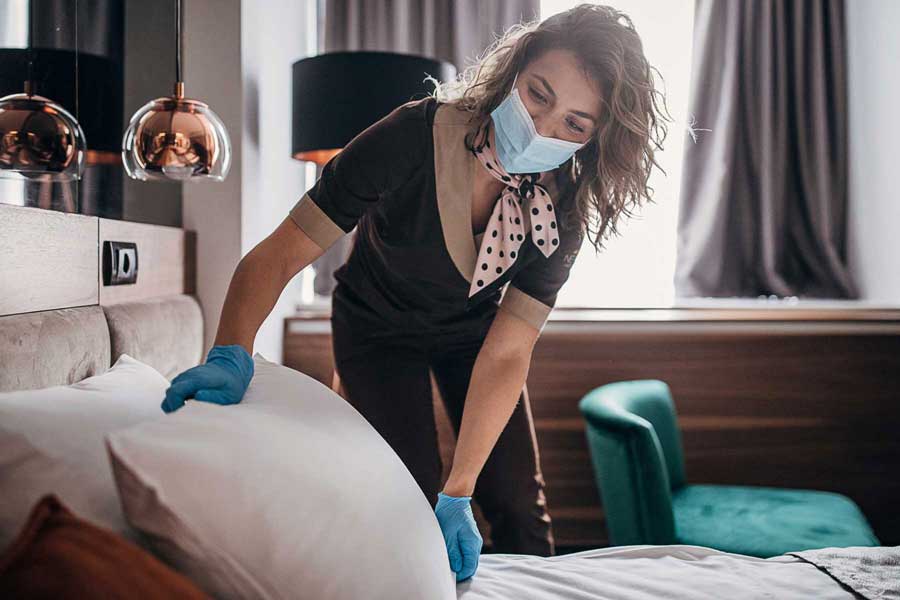Food poisoning is one of the biggest things that can ruin a trip. It’s unpleasant, costly, and prevents you from being able to fully enjoy your experience away from home. And while it isn’t always possible to completely avoid a stomach bug, there are things to can do to significantly lower your chances of having to deal with it.
In this post, you’ll discover some of the best ways to stay healthy while you travel, as well as what you should pack in your travel first aid kit and how to deal with food poisoning if it does happen to you.
What Causes Food Poisoning?
Food poisoning, also known as travelers diarrhea or Delhi Belly, are all names for a stomach infection called Gastroenteritis. There are three types of Gastroenteritis that cause similar symptoms – viral (norovirus, rotavirus, etc.) bacterial (salmonella, e. coli, etc.), and parasitic (giardia, etc.).
Since the symptoms are so similar and all three types can enter your system through food that is improperly cooked, handled or stored, I’ll continue to use the term “food poisoning” throughout this post.
Why you should to avoid food poisoning
The answer to this seems pretty obvious – it just sucks. We all know that getting sick can put a damper on our travel plans, and make our travels way more unpleasant than they need to be. But maybe you’re strong enough to power through it if it’s not too bad. That would be fine, right?
Well, not exactly.
When you get food poisoning, your body is fighting an infection, which means your immunity is lower than normal. And if, for instance, you’re fighting a bacterial infection and are then exposed to a viral infection, this can make you much sicker and even increase the risk of complications.
Another reason why you want to avoid food poisoning is that it can be expensive. Even if your travel insurance covers a trip to the doctor, plus any medications (or an overnight hospital visit, in extreme cases), you’ll probably have to pay for it upfront. And if you’re really sick, you may have to change flights and extend hotel stays. As nice as a holiday extension may seem, there’s not much to see when you’re stuck hunched over a toilet.
Before you go
• Make sure all your vaccinations are up-to-date. As long as this is done in time, you’ll be protected against certain foodborne illnesses such as Typhoid and Hepatitis A.
• Make sure you have good travel insurance. Even if you’re already covered through your credit card company, make sure it has all the coverage you might need.
• Research your destination. You should know whether the tap water is drinkable, and make sure you know where to go and who to contact in the event of an emergency.
• Pack a mini first aid kit to bring it with you everywhere you go. This should include rehydration salts, anti-diarrhea medication, anti-nausea medication and an oral thermometer. It’s also a good idea to tuck some wet wipes and hand sanitizer into your first aid kit – you never know when you might need them!
• If the tap water isn’t drinkable where you’re going, it’s a good idea to invest in water purification tablets or a LifeStraw (something I don’t travel without!), in case you’re unable to access clean water at any time during your trip.
• Find a good probiotic to bring with you, which will help keep your system strong and can help with your recovery if you do get sick. It’s best to find one that doesn’t recommend refrigeration.
How to avoid food poisoning on an airplane?
You can get sick from the airplane food. I’m sorry, but it’s true. One time I was out of action for a week after eating one funny-tasting shrimp that had probably been sitting out for too long. And it was business class food on a luxury airline.
• Make sure your food is hot when you receive it and don’t set hot meals aside to have later. If you’re traveling with a child sleeping during the meal service, don’t take their food tray and keep it until they wake up, especially if it’s a meat product. Food is only safe for a maximum of 2 hours at room temperature, and even that’s too long in some cases.
• In fact, avoid airplane food entirely. Even though most catering companies have strict rules on hygiene, much of the food is prepared by hand, and it’s possible that the proper procedures aren’t always followed. I’ve seen mold in airplane sandwiches, and even found part of a human nail in one once – even though it (thankfully) didn’t make me sick, the memory still does!
• Bring healthy snacks. This is the best way to make sure you don’t get sick from airplane food and is also much better for you since airplane food is loaded with sodium to make it taste better at high altitudes. As long as you’re not bringing liquids through security and leaving any fruits behind when you disembark, there are many options for meals you can pack yourself.
• Keep your immune system healthy. This won’t really prevent you from getting sick if you eat bad food, but it will help you fight it off so you recover faster. Take probiotics, get as much rest as you can, add some extra vitamins to your diet and stay hydrated, especially on long flights.
• Bring sanitizing wipes to cleanse your hands before you eat. Going to the lavatory and washing them properly is good too, but you still have to open the door, fasten your seatbelt, and touch your tray table before you dig in – and none of these things are properly cleaned between every flight.
• Don’t drink the water in the lavatories. Ever. Some airlines have specially filtered taps that you can refill your cup or bottle with, but unless it’s labeled as safe, don’t use it. If you need more water, just ask the flight attendants.
How to stay healthy when dining out?
There are some great restaurants out there, and you definitely want to get out and enjoy the local food. One of the best things you can do to make sure you pick the right restaurant is to read reviews – both the good and bad. Just keep in mind that if a place is rated low for bad service, that often doesn’t mean the food is bad. Try to pick a place that has good reviews from locals, rather than just tourist reviews – you want a place the locals know and trust.
• Buffets are delicious but are a common cause of food poisoning. If you want to enjoy a buffet, try to get there as early as possible so the food isn’t sitting out for too long. Restaurant buffets that don’t have a high volume or don’t seem to be replenished regularly should be avoided if possible.
• Know whether the water at your destination is drinkable. Remember that this can vary between cities and even regions within a city. Some places will offer tap water even if it isn’t particularly drinkable in that area, so make sure it comes in a bottle when you order water.
• Even though your drink is probably going to taste better with ice, it’s best to order it without. In developing countries, ice can be made with unclean water instead of filtered. Even in developed countries like the USA, ice machines at restaurants and bars may not be regularly cleaned (though most will be to avoid being slapped with a huge fine).
• Another sneaky culprit for food poisoning are those innocent-looking lemon and lime slices in your drink. Very few places actually wash these before slicing them, and they can spend a lot of hours sitting on a counter before they end up in your glass. They’re even less likely to be clean in developing countries. As they say – if in doubt, leave it out!
How to avoid getting sick from street food?
Many people are afraid to eat street food when traveling to places like Southeast Asia. But there are a lot of street food stalls that are safer to eat at than the local Western-style restaurants, you just need to know how to find the right ones!
• Look at the people in line. It’s good to pick a food stall that has a line of locals rather than tourists, and the more children in line, the better – parents generally won’t have their kids eat at a place that has previously made them sick.
• Find out when the popular meal times are in the country you’re in, and plan to eat when the locals do. Though it means you’re likely to be waiting a bit longer, it also means there is more food being made fresh, rather than just sitting around for someone to buy it.
• Watch the cooks work. Are they wearing gloves? Do surfaces look clean? Do they wash their hands or change their gloves between touching money and food? Does the water they wash dishes in look like it gets regularly changed? If the answer to any of these questions is no, you may want to look somewhere else.
• Food that comes on a stick saves you from needing to worry about dirty chopsticks or cutlery, but what if it doesn’t? If you’re given disposable cutlery, it’s most likely safe, but have a look before you dig in, just in case. Better yet, bring your own eating utensils or some wipes to clean utensils before using them.
• Be cautious with salads and desserts that have fresh, unpeeled fruit in them. Don’t just assume that it’s safe since it’s on the menu – it could still have been washed with tap water.
How to cook food safely while traveling?
If your accommodation has a kitchen, like a serviced apartment, hostel or Airbnb, it can often be healthier and more cost-efficient to prepare your own food. And though you should be fine as long as you use your common sense, there are still some things you need to be aware of, particularly if you’re in the developing world.
• As mentioned above, find out if the tap water is safe. If it isn’t, stick to bottled or boiled water. Water is safe once it’s been boiling steadily for 1 minute – except at altitudes above 6,500ft when you should boil water for at least 3 minutes to kill all the bad stuff.
• Take caution with fruits or vegetables. Try to stick with fruits that have thick skin, and rinse them well with clean water. Veggies are safest when they’re cooked, but if you choose to eat them raw, make sure you rinse and peel them.
• Be cautious about buying frozen or refrigerated foods in places that have frequent power cuts, unless you know they have a backup generator.
• Make sure all surfaces in your accommodation are clean. It’s a good idea to wash dishes and cutlery before you use them, just in case the person before you didn’t clean them properly.
• Double-check the temperature of the refrigerator. The ideal temperature for storing food is between 1-2° C, anything higher than that could cause dangerous bacteria to grow. If you frequently stay in Airbnbs or serviced apartments, consider getting a tiny fridge thermometer to take with you on your trips.
• When buying packaged goods, check expiry dates and make sure the packaging hasn’t been tampered with or broken. This could be a sign that a rodent has gotten into it. Even if that’s not the case, it could be a perfect breeding ground for bugs or mold.
What to do if you get sick while traveling?
It can be scary getting sick when you’re far from home. But mild cases of food poisoning, though unpleasant, aren’t anything to be afraid of, and in most cases, you can treat symptoms yourself.
• Do drink plenty of fluids. You should also take rehydration salts to avoid dehydration – be sure to follow the instructions on the packaging, as some rehydration salts are different than others.
• Do take probiotics. Although they won’t cure you of your illness, they have been proven to speed recovery.
• Do eat light foods once you can stomach it. Stick to things like bananas, plain rice, crackers and bread. It’s a good idea to keep eating a bland diet until you’ve recovered.
• Don’t take medication to stop diarrhea, unless you have travel plans you can’t cancel. If you have food poisoning caused by bacteria, diarrhea is your body’s best way to flush out the bad stuff.
• Don’t take self-prescribed antibiotics. In some cases of food poisoning, antibiotics won’t help at all, and can even make your symptoms worse.
When to see a doctor?
Most symptoms of food poisoning will go away on their own within a couple of days. Though you most likely won’t need to see a doctor, you should if you notice any of the following:
• Fever of more than 38.6° C (101.5° F).
• Severe stomach pain.
• Blood in your vomit or poop.
• Diarrhea that lasts longer than 3 days.
• Inability to keep down clear fluids.
• Signs of severe dehydration, such as dizziness, an extremely dry mouth, excessive thirst or a lack of urination.
DON’T WORRY!
As long as you’re prepared you don’t have much to worry about. Traveling is amazing, and each part of the world has its own delicious food that you absolutely should try. Just remember to trust your instincts and common sense, and keep in mind the traveler’s mantra: “boil it, cook it, peel it, or leave it”!



